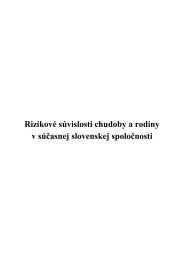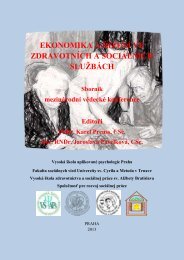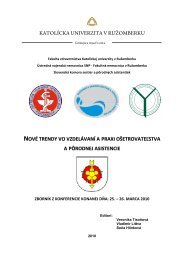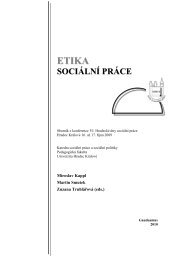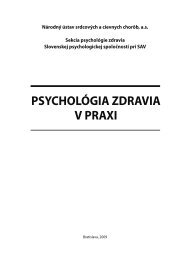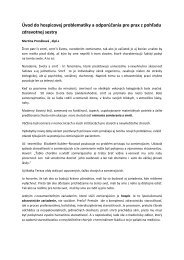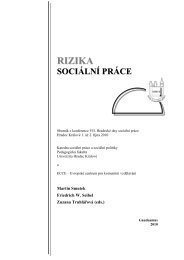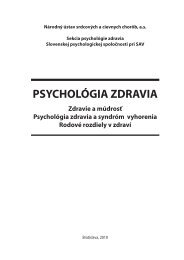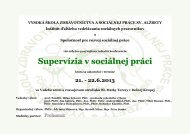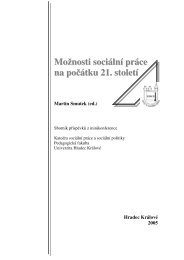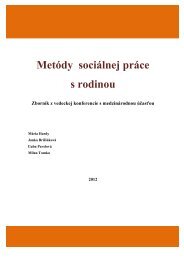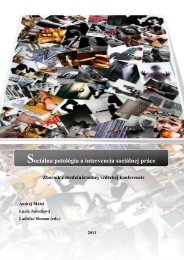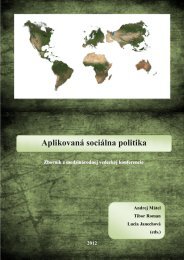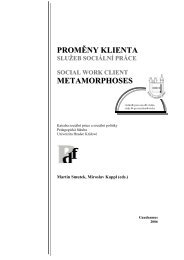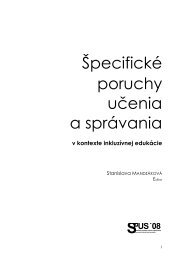Zmena klÃmy â možný dopad (nielen) na obyvateľstvo - Prohuman
Zmena klÃmy â možný dopad (nielen) na obyvateľstvo - Prohuman
Zmena klÃmy â možný dopad (nielen) na obyvateľstvo - Prohuman
You also want an ePaper? Increase the reach of your titles
YUMPU automatically turns print PDFs into web optimized ePapers that Google loves.
phase of the research. Furthermore, the possibility of these stereotypical impressions<br />
being reaffirmed in early childhood educatio<strong>na</strong>l settings (Derman-Sparks<br />
and Phillips 1997) was highlighted by phase two of the research. Even when educators<br />
deliberately sought to provide a more critical and diverse perspective on, in<br />
this case, Kenya, as in the third phase of the research process, there was evidence<br />
that children’s learning continued to be influenced by prevailing attitudes held at<br />
home and elsewhere. The research highlights the importance, documented elsewhere<br />
(Ramsey, 2008b) of ensuring stereotypes are not reinforced.<br />
The programme explores the lives and environments of people living in Ireland<br />
and Kenya without constructing bi<strong>na</strong>ries or simplistic categorisations. For<br />
example, the learning experiences included in the programme seek to emphasise,<br />
through art and image work, both the plurality of identities and the idea<br />
of multiple identities, exploring the similarities and differences between and<br />
within the countries in question. The programme, focussing on global justice,<br />
does not deal explicitly with the issue of race. However, it does not attempt to<br />
negate or avoid racial differences and encourages educators to respond to racial<br />
attitudes as they arise. Where educators felt comfortable in examining racial<br />
prejudice and difference, there was evidence of dialogue between children and<br />
educators examining more critically issues of race and equality. The findings<br />
support suggestions that children of early primary-school age are able to participate<br />
in and contribute to discussion relating to issues of race and diversity<br />
(Husband, 2010), with children raising issues about their own and others’ ethnic<br />
and racial identities.<br />
Building Empathy and Perspective Consciousness as a Tool<br />
to Understanding and Equality<br />
The findings from the research suggest that the approach adopted by the programme<br />
supported children’s engagement with cultural and racial difference<br />
without recourse to, or affirmation of, stereotypes or a discourse of ‘them and<br />
us’. Concerns regarding a tendency for multi-cultural education to be superficial,<br />
to exoticise difference and to reinforce bias (Robinson et al., 2009; Ramsey,<br />
2008b), were far less apparent where participating educators used the suggested<br />
programme in phase three of the research than in phase two. Children involved<br />
in phase three of the research were encouraged to actively empathise with the<br />
characters in the materials, pretending to be them in a Kenyan market play corner<br />
and drama activity, verbalising the character’s thoughts at different points of their<br />
story, advising the Adika puppet on challenges he raised. Through these learning<br />
experiences the children were reported to engage with the characters on an<br />
182



